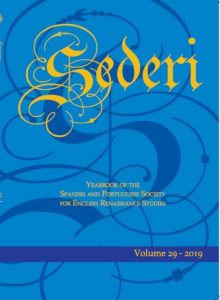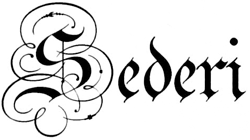
Sederi 29
Sederi 29 — 2019
EDITOR
Ana Sáez-Hidalgo
MANAGING EDITOR
Keith Gregor
REVIEW EDITOR
María José Mora
ISSN 1135-7789
Elizabeth Mazzola, “Suffocated mothers, stabbed sisters, drowned daughters: when women choose death on Shakespeare’s stage.” SEDERI 29 (2019): 109–33.
DOI: https://doi.org/10.34136/sederi.2019.5 Download PDF
Abstract
Women who choose death on Shakespeare’s stage often overturn ideas about tragedy as well as challenge the politics which establish which lives are worth sacrificing and which ones are not. Radically altering the relation between bios and zoe, female suicides collapse the divisions between things that grow, breathe, and love, and those things that block such living. In this essay, I draw on thinking about biopolitics along with feminist readings of Shakespeare in order to explore how characters like Goneril, Gertrude, and Juliet refuse the rules which determine how women’s blood must flow or be shed.
Keywords: bios and zoe; female suicides; Shakespeare; tragic heroines; Goneril, Gertrude, Juliet, Ophelia, Cleopatra; Antigone.
References
Agamben, Giorgio. 1993. Infancy and History: On the Destruction of Experience. Translated by Liz Heron. New York: Verso.
Agamben, Giorgio. 1998. Homo Sacer: Sovereign Power and Bare Life. Translated by Daniel Heller-Rozen. Stanford: Stanford University Press.
Agamben, Giorgio. 2005. State of Exception. Translated by Kevin Attell. Chicago: University of Chicago Press.
Alexievich, Svetlana. 2017. The Unwomanly Face of War: An Oral History of Women in World War II. Translated by Richard Pevear and Larissa Volokhonsky. New York: Random House.
Badiou, Alain. 2007. “Destruction, Negation, Subtraction—on Pier Paolo Pasolini.” Graduate Seminar Art Center College of Design in Pasadena. February 6, 2007. Accessed June 27, 2019. https://www.lacan.com/badpas.htm.
Bamber, Linda. 1982. Comic Women, Tragic Men: A Study of Gender and Genre in Shakespeare. Stanford: Stanford University Press.
Bartels, Emily. 2016. “Identifying the Dane: Gender and Race in Hamlet.” In The Oxford Handbook of Shakespeare and Embodiment, edited by Valerie Traub, 197–201. New York: Oxford University Press.
Butler, Judith. 2000. Antigone’s Claim: Kinship between Life and Death. New York: Columbia University Press.
Callaghan, Dympna. 1989. Women and Gender in Renaissance Tragedy. Atlantic Highlands, NJ: Humanities Press.
Daube, David. 1983. “Black Hole.” Rechtshistorisches Journal 2: 177–93.
Edelman, Lee. 2004. No Future: Queer Theory and the Death Drive. Durham: Duke University Press.
Edelman, Lee. 2011. “Against Survival: Queerness in a Time That’s Out of Joint.” Shakespeare Quarterly 62 (2): 148–69.
Esposito. Roberto. 2004. Bios: Biopolitics and Philosophy. Translated by Timothy Campbell. Minneapolis: University of Minnesota Press.
Freccero, Carla. 2011. “Romeo and Juliet Love Death.” In Shakesqueer: A Queer Companion to the Complete Works of Shakespeare, edited by Madhavi Menon, 302–8. Durham: Duke University Press.
Gallagher, Lowell. 1995. “Mise en Abyme, Normative Subjectivity, and the Ethics of Mimesis in Hamlet: Gertrude Talks.” Genre 28 (2): 513–41.
Jacques, Karen, and Paul J. Taylor. 2008. “Male and Female Suicide Bombers: Different Sexes, Different Reasons?” Studies in Conflict and Terrorism 31: 304–36.
Johnston, Sarah Iles. 2006. “Antigone’s Other Choice.” Helios 33: 179–85.
Kiséry, András. 2017. Hamlet’s Moment: Drama and Political Knowledge in Early Modern England. New York: Oxford University Press.
Lupton, Julia Reinhard. 2016. “Public Women/Women of Valour.” In Shakespeare in Our Time., edited by Dympna Callaghan and Suzanne Gossett, 285–88. New York: Bloomsbury.
MacDonald, Michael. 1977. “The Inner Side of Wisdom: Suicide in Early Modern England. “ Psychological Medicine 8: 565–82.
MacDonald, Michael. 1986a. “Ophelia’s Maimed Rites.” Shakespeare Quarterly 27 (3): 309–17.
MacDonald, Michael. 1986b. “The Secularization of Suicide in England, 1660–1800.” Past and Present 111: 50–110.
Morgan, Lynne M. 1998. “Ambiguities Lost: Fashioning the Fetus into a Child in Ecuador and the US.” In Small Wars: The Cultural Politics of Childhood, edited by Nancy Scheper-Hughes and Carolyn Sargent, 58–74. Berkeley: University of California Press.
Neely, Carol Thomas. 1985. Broken Nuptials in Shakespeare’s Plays. New Haven: Yale University Press.
Ratcliffe, Stephen. 1998. “What Doesn’t Happen in Hamlet: The Queen’s Speech.” Exemplaria 10 (1): 123–44.
Rose, Mary Beth. 1982. Gender and Heroism in Early Modern English Literature. Chicago: University of Chicago Press.
Rose, Mary Beth. 2016. “Suicide as Profit and Loss.” In Shakespeare in Our Time: A Shakespeare Association of America Collection, edited by Dympna Callaghan and Suzanne Gossett, 73–80. New York: Bloomsbury.
Scheper-Hughes, Nancy, and Carolyn Sargent, eds. 1998. Small Wars: The Cultural Politics of Childhood. Berkeley: University of California Press.
Schwarz, Kathryn. 2016. “Comedies End in Marriage.” In The Oxford Handbook to Shakespeare and Embodiment, edited by Valerie Traub, 267–86. New York: Oxford University Press.
Shakespeare, William. 2015. The Norton Shakespeare. Edited by Stephen Greenblatt, Walter Cohen, Jean E. Howard, Katharine Eisaman Maus, Gordon McMullan, and Suzanne Gossett. New York: Norton.
Sophocles. 2000. Three Theban Plays. Edited by Robert Fagles. New York: Penguin.
Stockton, Will. 2016. “The Fierce Urgency of Now: Queer Theory, Presentism, and Romeo and Juliet.” In The Oxford Handbook of Shakespeare and Embodiment, edited by Valerie Traub, 297-301. New York: Oxford University Press.
Waldron, Jennifer. 2012. “Of Stones and Stony Hearts: Desdemona, Hermione, and Post-Reformation Theater.” In The Indistinct Human in Renaissance Literature, edited by Jean E. Feerick and Vin Nardizzi, 204–27. New York: Palgrave.
Wynne-Davies, Marion. 2012. “Ophelia’s Ghost.” Alicante Journal of English Studies 25: 151–66.
